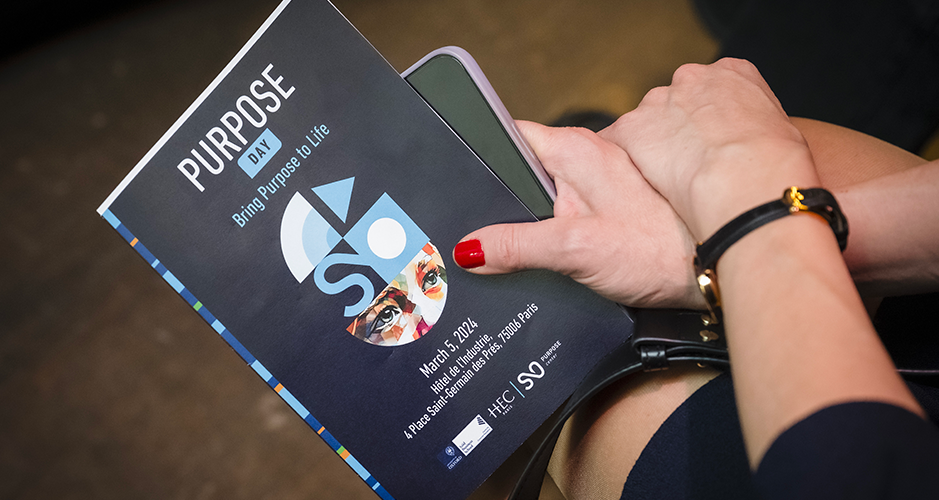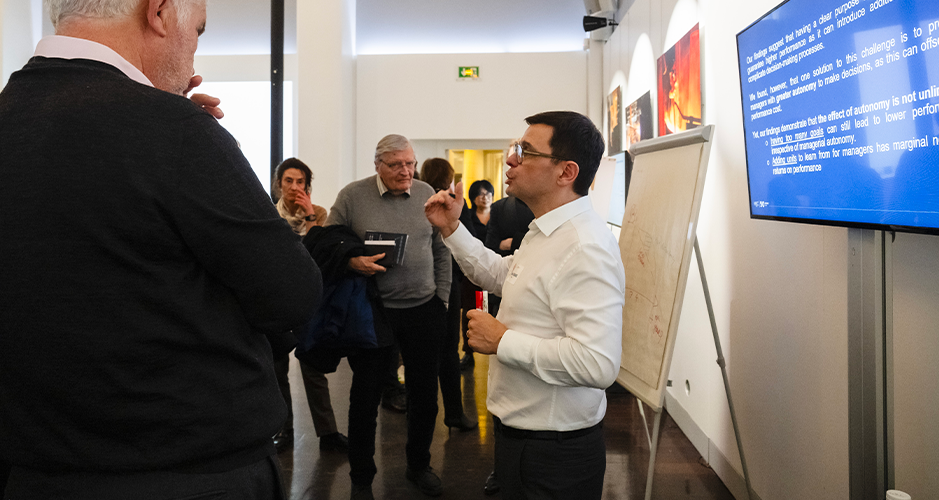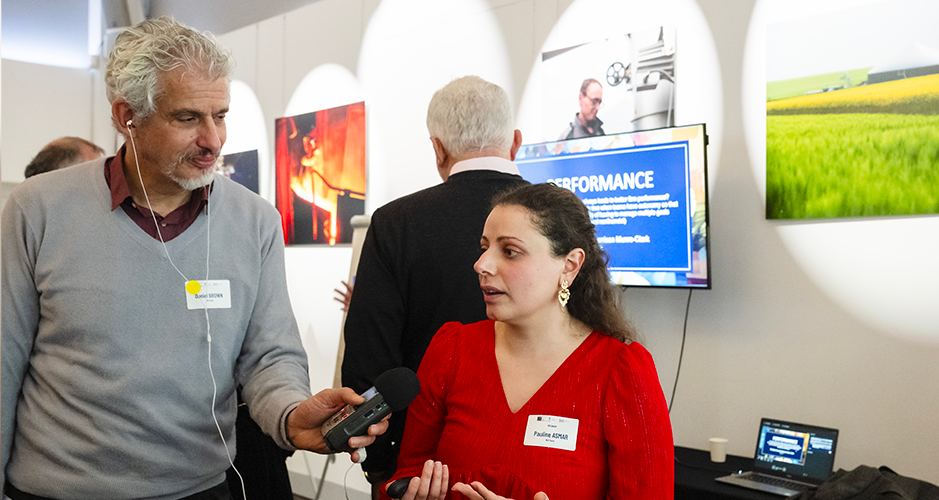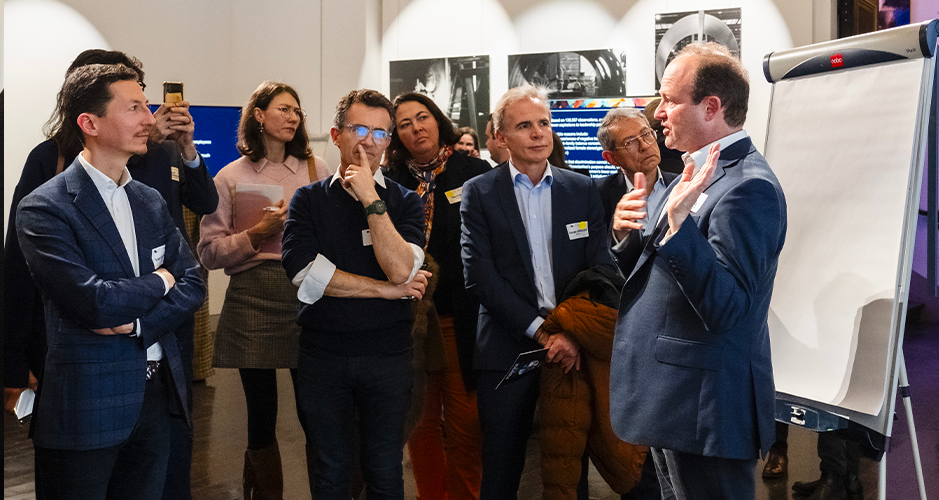SBS Oxford and HEC Continue to Grow their Research on Purpose
The HEC Sustainability & Organizations Institute (S&O) hosted the 2024 Purpose Day in the stately Hôtel de l’industrie, a stone’s throw from Paris’mythical Deux Magots and Café Flore. “Purpose at Work” and “Visions of Purpose”: the chosen topics for this second edition of the annual event brought together international actors and observers in an ambitious format designed to create bridges between academic work and the tough challenges of the 21st century. It culminated in a rousing speech by Ed Freeman, awarded an HEC Honoris Causa the previous day. This year, we focus on the research presented during the daylong event illustrating the growing collaboration between HEC and University of Oxford – Saïd Business School (SBS).

For the inaugural 2023 Purpose Day a year ago, over 100 people filed into the Philanthro-Lab in central Paris. A year later, they were more than twice that number for edition Number Two: researchers, corporates, investors, students and regulators, all exploring ways to translate the notion of purpose into authentic action. “This is an important steppingstone in S&O’s commitment to bridge practice and research and we really saw it blossom today,” said a satisfied Rodolphe Durand, The Joly Family Purposeful Leadership Chair Professor was not just there as a co-organizer, but also as one of six researchers sharing his latest explorations in a dynamic afternoon workshop. This featured three academics from SBS and as many from HEC Paris. “There were obviously different perspectives and themes,” continued Durand. “But all the presentations had purpose at their heart and one key learning brought them together: purpose doesn’t drive performance mechanically.” Durand’s own work, outlined during the workshop, explores the teams’ autonomy and the firm’s ability to reduce the cost of managing organizational purpose.
 Professor Rodolphe Durand and his research presentation
Professor Rodolphe Durand and his research presentation
The six researchers exposed links between purpose and authenticity, diversity, governance, incentives and performance. Two of them shared complementary aspects of gender diversity and inclusion. HEC professor Ekaterina Netchaeva described her breakthrough work on gender differences in aspirations and the major role they play in acceding to leadership roles. For years, Netchaeva has been trying to understand why women are not gravitating to leadership positions despite the undisputed push towards gender equality in business. The HEC assistant professor in the Management & Human Resources department described her research showing that it’s more than structural barriers preventing women adapting these positions: “My work on a sample of 140,000 people in the US shows that women show less interest in pursuing these leadership positions compared to men.” She puts these sobering conclusions down to reasons which include possible interiorization of gender stereotypes at around 18 years old, the negative treatment women may experience at lower organizational levels and work/family balance concerns.
 Laura Fritsch from Saïd Business School
Laura Fritsch from Saïd Business School
Meanwhile, the SBS post-doctoral Research Fellow Laura Fritsch shared her fascinating approach to how gendered speech characteristics, like “uptalk” (rising intonation at the tail-end of a declarative sentence), can have a negative impact on analysts and markets. Fritsch explained: “When women CEOs use a traditionally female way of talking like uptalk, their analysts penalize them for doing so. If these leaders use confident lowtalk, however, we find no impact on analysts’ behavior; That’s because uptalk is linked to uncertainty – as well as friendliness!” The academic, who also specializes in climate strategy, paused. “The result of our scientific findings are, well, really sad. Female CEOs and the companies they represent are negatively penalized because they behave in a gender congruent way. It’s true across different industries and true in boom-and-bust cycles - we tested it over 20 years and with a sample of 140,000 people working in over 4,000 American firms.”
The Keyword is… Authenticity
Fritsch’s paper is currently under review by Nature magazine but has already attracted media attention. This could soon be the case for the work of Ph.D. student, Pauline Asmar. The Lebanese scholar is in her fourth year at HEC where she’s been studying how managers interact with their team members in purpose-led firms and its impact on employee behavior. “Is there an alignment between actions and the values that they claim to defend?” she wonders. “Do managers treat all their employees in an equal manner and offer them all the same opportunities? What impact does purpose-based communication have on the team, especially when they are not being treated equally? These are some of the questions I’ve been exploring for the past years.” To answer them, Asmar pored over data and companies from all over the world, delving on firms in different sectors and personnel at multiple levels “I wanted to understand the heterogeneity within the firm. And why certain companies are successful at being purpose driven and enjoying financial success while others didn’t achieve the same kind of performance. I found that the key word here is authenticity. To begin with, it’s at the individual level, how managers and their actions align with their personal values. Authenticity is also reflected in how managers act and treat their team members. In order to measure this, we have used the variation of the quality of team communication.”
 Pauline Asmar: “How do managers act and treat their team members?”
Pauline Asmar: “How do managers act and treat their team members?”
At the three-hour workshop entitled Purpose at Work, Rodolphe Durand led by example by sharing his research on the costs involved in structuring a purposeful organization. “We show how purpose only leads to better performance when company teams have a degree of autonomy in order to handle the complexity of having to manage multiple financial and non-financial goals,” he told an audience standing in a half-circle around him.
Amongst them was HEC Ph.D. candidate Andrew Montandon who followed the six presentations closely: “The practitioners listening were keen to know more about the timeline to apply the framework that Oxford academic Rupert Younger mapped out,” Montandon noted, an example of the degree of engagement around all the presentations. “How often should firms evaluate their approach towards corporate purpose? Do they have to wait for the period of succession to propose advancements in corporate governance? What aspects of purpose governing should be attended to first?” The questions rained in hard and fast on the researchers.
Translating Words on Page into Outcomes
Indeed, Rupert Younger is the highly engaging director of SBS’ Center for Corporate Reputation. For his research, he’s drawn on his 16 years at Oxford and a career as a consultant helping large companies articulate their purpose and build what he calls a social license to operate: “What I mean by that is working on legitimacy, status, stigma, celebrity reputation and trust. Purpose fits in within those factors because it builds social license.” At Purpose Day, Younger presented his Center’s Enacting Purpose initiative which federates his researchers with those from Berkeley and the British Academy. “We’re trying to answer the question: ‘How do you translate words on a page into something that means something to people both in and outside an organization?’ In other words, what conditions are needed to transform purpose into outcomes?” Younger proceeded to delineate a framework whereby employees bought into desirable outcomes. “This requires a degree of experimentation and imagination on behalf of the organizational planners.” The author of the bestselling The Reputation Game fielded several questions on the timeline and the challenges of a governance framework that, at times, is frozen by the immobility of the organization’s board of directors or some of its outdated values.
 Rupert Younger explaining the conditions needed to transform purpose into outcomes.
Rupert Younger explaining the conditions needed to transform purpose into outcomes.
Samuel Mortimer’s research has also pinpointed challenges to employees’ engagement to purpose. The Research Fellow at SBS described the restrictions on employees’ purposeful work because managers believe this work is sufficient an incentive and no additional renumeration is needed. This restricts incentivization and sometimes leads to negative stereotyping of the employees based on their perceived interests.
Joint HEC-SBS Commitment to Acting on Purpose
The 2024 Purpose Day marked a major step forward in HEC and SBS’ joint drive to integrate their respective research with the realities faced by practitioners. “I’m delighted at how the day combined ever more people from the business world such as HR directors, board members, etc, with our students and research academics,” said Rodolphe Durand who is also a professor in HEC’s Strategy and Business Policy department. “The research and debriefing sessions brought so many thought-provoking questions for us to work on for next year’s Purpose Day. And I’m looking forward to increasing our collaborations with our colleagues at Oxford over these.”
This spirit of collaboration was at the forefront of the Academic Keynote speech by Edward Freeman, the American founder of the stakeholder view of the firm. Freeman had been rewarded an honorary doctorate by HEC the previous day and seemed filled with optimism at the energy he found at the Hôtel de l’industrie event. As he did in accepting the Honoris Causa award, Freeman acknowledged the impact Jean-Paul Sartre and Simone de Beauvoir had on his work. The mythical duo brewed some of their ground-forging philosophy at the Café Flore. “In this café just around the corner from here, Sartre and Beauvoir talked about self-deception and bad faith,” Freeman told the packed audience in the closing Purpose Day session called Visions of Purpose. “These are real things for human beings. You won't find much reference to them in business literature. Yet, these reflections are part of our foundational texts with the kind of insights that are really helpful in the world we live in. And long may they be integrated into events like this one!”
The growing partnership between HEC Paris and SBS takes another decisive step this year with a joint publication of, first, the key takeaways from Purpose Day N°2 and, second, a White Paper destined for regulators, to be published in the fall. Yet another chapter in this commitment to joining research to action.